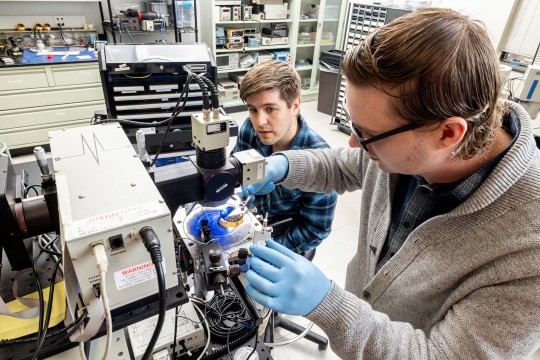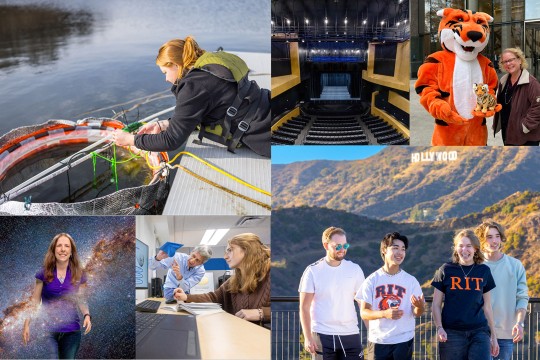Student Spotlight: Writing Commons consultant helps other students improve writing skills
Claudia Alant, a fourth-year mechanical engineering student, is one of many students who works as a peer consultant for the Writing Commons.
Claudia Alant, a fourth-year mechanical engineering student from Niskayuna, N.Y., has worked for the Writing Commons for five semesters. Since she was in high school, Alant has participated in advanced writing courses and has continued honing in on her communications skills as a student at RIT. After taking the Writing Genre, Theory and Practice course, she was recommended to work for the Writing Commons. According to Alant, being a peer consultant for the commons is “one of the coolest jobs an undergraduate student can have” on campus.
Outside of her work and classes, Alant is an active member of the RIT Hot Wheelz team, where she assists with projects dealing with the suspension, wheels and propulsion groups for the racing car the team builds every year. After she graduates, she hopes to move to the West Coast to work in the aerospace industry.
The Writing Commons provides writing support for students of all levels and disciplines free of charge. More information is available on the Writing Commons webpage.
What is the Writing Commons and why is it useful for students?
The Writing Commons is a collection of professors and students who provide writing support across all disciplines throughout the university. Whether a student needs a second set of eyes on a draft that’s almost done or needs help with formatting citations at the tail end of their paper, we can help. If you have feedback you need help understanding, or just the assignment in general, any consultant would be happy to help. We can help students with any stage of the writing process so long as they take the initiative to make an appointment.
Why did you want to work at the Writing Commons?
I think that writing is a critically important skill for any discipline. It doesn’t matter whether you’re a journalism major or an engineer, effective communication is key. By working as a consultant, I get to exercise my writing ability and meet a wide and diverse variety of students. Every shift can be really interesting because of the variety of assignments students bring in. Sometimes, people will come in with a humanities paper about a theoretical debate and they’re trying to craft their claim. Other times, people come in with very technical writing and they don’t know how to present their research effectively. I learn just as much as I teach, and that’s why I like it.
What responsibilities do you have as part of your job?
My responsibilities consist of three main things. First is working in consultations with students. This is where students can go online and book an appointment to get help from one of our many consultants. Second is an hour a week we dedicate to professional development. That’s where our consultants and Writing Commons coordinator, Phil Shaw, come together to foster a sense of community and to learn from one another’s expertise. My third main responsibility is called an inquiry project. Each consultant in the Writing Commons will research and draft an open-ended inquiry project that interests them throughout the semester. Then, we present them in the professional development meetings so we can sharpen our expertise, expand our knowledge and broaden our horizons on the kind of tools we can bring into play during a consultation. This semester, mine is about the use of predicates and what they can tell us about a student, which can influence the different tools we use during a session. In a technical institution, there are a lot of students who are visual learners, and writing isn’t usually visual to people. So, I’m looking at different tools we can use to make the process more visual to cement the understanding of writing fundamentals in students.
Why do you think it’s important to have fellow students available to help students who may be struggling with writing, as opposed to exclusively having adult staff members?
I think having students working here brings a little diversity into the Writing Commons since we all come from different disciplines. I’m a mechanical engineer, and we have a software engineer, a computer science engineer, an industrial engineer, communications and psychology students, and so on. There are a ton of different vantage points we can work from, so I think that fact brings something special to what we offer. Also, having student consultants brings a sense of camaraderie and even some compassion. Students will come in and, maybe, their assignment is due tonight, or it’s something they’ve been stressing about. Another student who works here can look at them and say, “I’ve been where you are and I know how you feel, but you’ve got this and I can help you.”
How do you think having this job has made you a better student leader, or enhanced your understanding of writing and teaching?
I think this position has helped me be a better a student leader by exposing me to a diverse group of writers in a variety of disciplines. There are many international students that I’ve met because of this, or students that I would have never encountered who work in different fields, and working with these students one-on-one has helped me to be more adaptive and experimental. The same tactics won’t work for every student, so I think that working here has helped me understand that. In terms of writing and teaching, I think the sheer exposure to writing inherently enhances my understanding of writing and improves my own writing process.






